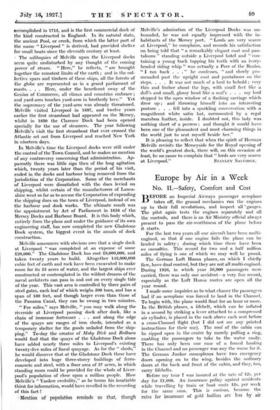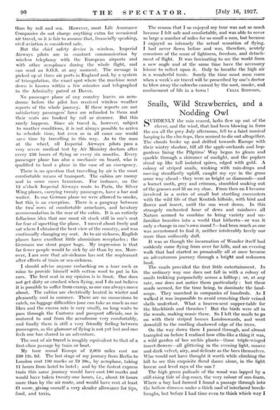Europe by Air in a Week
No. II.—Safety, Comfort and Cost BEFORE an Imperial Airways passenger aeroplane takes off, the ground mechanics run the engines up to their full revolutions, and inspect all gauges. The pilot again tests the engines separately and all the controls, and there is an Air Ministry official always present to pass the air-worthiness of the plane before it starts.
For the last two years all our aircraft have been multi- engined, so that if one engine fails the plane can be landed in safety ; during which time there have been no casualties. This record for two and a half million miles of flying is one of which we may well be proud.
The German Luft Hansa planes, on which I chiefly flew, have dual control, but they are not all multi-engined. During 1926, in which year 56,000 passengers were carried, there was only one accident—a very fine record, especially as the Luft Hansa routes are open all the year round.
I made some inquiries as to what chance the passengeis had if an aeroplane was forced to land in the Channel. To begin with, the plane would float for an hour or more. In the British planes, a lifebelt, which can be inflated in a second by striking a lever attached to a compressed air cylinder, is placed in the rack above each seat before a cross-Channel flight (but I did not see any printed instructions for their use). The roof of the cabin can be ripped open' in the centre by merely pulling a ring, enabling the passengers to take to the water easily. There has only been one case of a forced landing in the Channel and no passenger was any the worse for it. The German Junker monoplanes have two emergency doors opening on to the wing, besides the ordinary doors at the back and front of the cabin, and they, too, carry lifebelts.
Before my tour I was insured at the rate of 12s. per day for £1,000. An insurance policy against accidents while travelling by train or boat costs 12s. per week for the same sum. This is curious, because the rates for insurance of gold bullion arc less by air than by rail and sea. However, most Life Assurance Companies do not charge anything extra for occasional air travel, so it is fair to assume that, financially speaking, civil aviation is considered safe.
But the chief safety device is wireless. Imperial Airways pilots are in constant communication by wireless telephony with the European airports and with other aeroplanes during the whole flight, and can send an S.O.S. at any moment. The message is picked up at three air ports in England and, by a system of triangulation, the exact spot where the machine went down is known within a few minutes and telegraphed to the Admiralty patrol at Dover.
No passenger plane of any country leaves an aero- drome before the pilot has received wireless weather reports of the whole journey. If these reports, are not satisfactory passengers' fares are refunded to them and their seats are booked by rail or steamer. But this rarely happens. Since air travel is, however, subject to weather conditions, it is not always possible to arrive to schedule time, but even so in all cases one would save time by travelling in this way. As to the man at the wheel, all Imperial Airways pilots pass a very severe medical test by Air Ministry doctors after every 250 hours of flying or every six months. Every passenger plane has also a mechanic on board, who is qualified to land a plane in the case of an emergency.
There is no question that travelling by air is the most comfortable means of transport. The cabins are roomy and in some cases luxurious. For instance, on the 12 o'clock Imperial Airways route to Paris, the Silver Wing planes, carrying twenty passengers, have a bar and waiter. In one German plane we were allowed to smoke, but this. is an exception. There is a gangway between the two rows of comfortable armchairs, and lavatory accommodation in the rear of the cabin. It is an entirely fallacious idea that one must sit stock still in one's seat for fear of upsetting the plane. I moved about freely and sat where I obtained the best view of the country, and was continually changing my seat. As to air sickness, English planes have excellent little aluminium receptacles ; the Germans use stout paper bags. My impression is that far fewer people would be sick by air than by sea. More- over, I am sure that air-sickness has not the unpleasant after effects of train or sea-sickness.
I should advise anyone embarking on a tour such as mine to provide himself with cotton wool to put in his ears. The best seat in my opinion is in front. One does not get dirty or crushed when flying, and I do not believe it is possible to suffer from cramp, as one can always move about. The cabins are electrically heated in winter and pleasantly cool in summer. There are no connexions to catch, no luggage difficulties (one can take as much as one likes and the excess rate is very small), no long waits to pass through the Customs and passport officials, one is motored to and from the aerodrome very comfortably, and finally there is still a very friendly feeling between passengers, as the glamour of flying is not yet lost and one feels one has shared in an adventure.
The cost of air travel is roughly equivalent to that of a first-class passage by train or boat.
My tour round Europe of 2,000 miles cost me £80 12s. 6d. The last stage of my journey from Berlin to London cost 190 marks or £9 10s., by aeroplane, taking 11 hours from hotel to hotel ; and by the fastest express train this same journey would have cost 180 marks and would have taken twenty-one hours, i.e., about 10 hours more than by the air route, and would have cost at least £1 more, giving oneself a very slender allowance for tips, food, and taxis. The reason that I so enjoyed my tour was not so much because I felt safe and comfortable, and was -able to cover so large a number of miles for so small a sum, but because I enjoyed so intensely the actual sensation of .flying. I had never flown before and was, therefore, acutely conscious of the sense of lightness, freedom, and detach-- ment of flight. It was fascinating to see the world from a new angle and at the same time have the necessary leisure to reflect upon it. Only to breathe the high air is a wonderful tonic. Surely the time must soon come when a week's air travel will be prescribed by one's- doctor to blow away the cobwebs caused by the soot, smoke, and confinement of life in a town ! CELIA SIMPSON,:











































 Previous page
Previous page